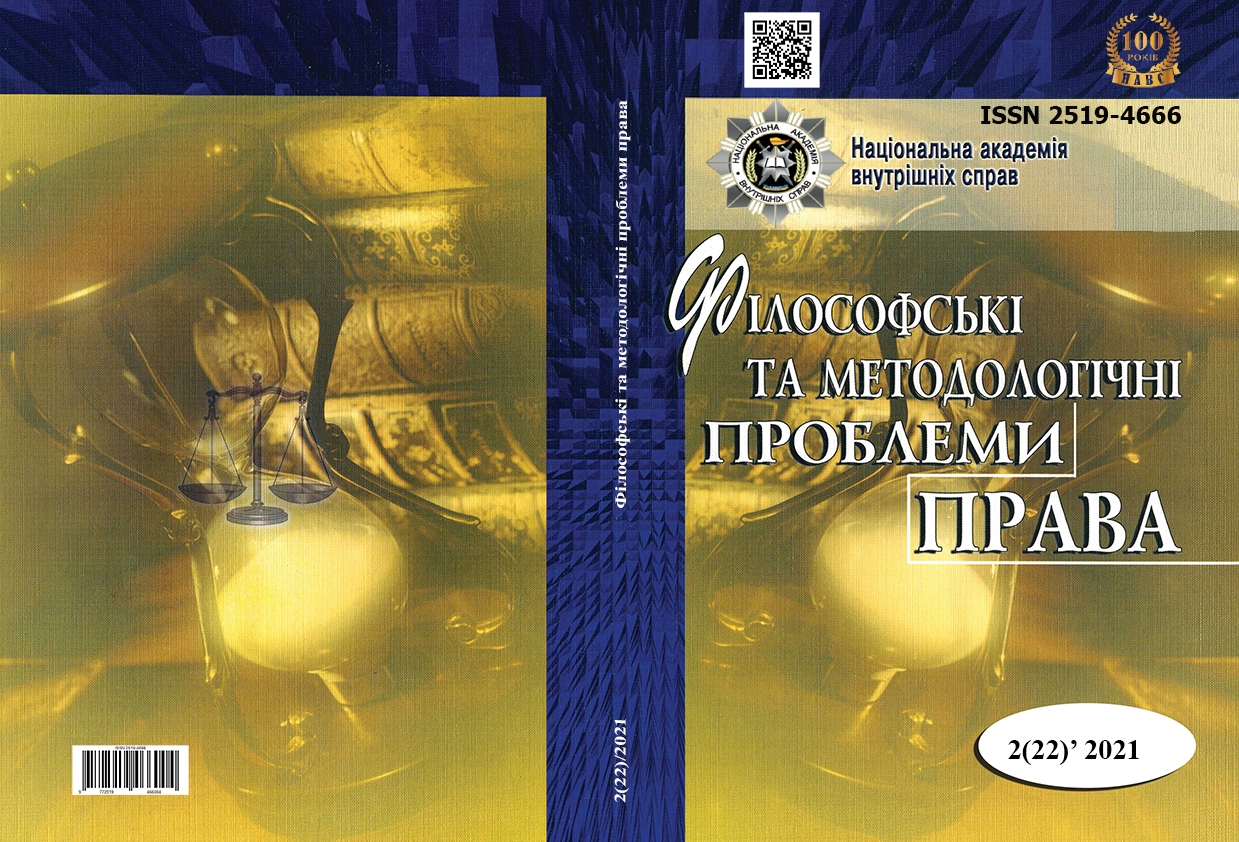Philosophical and Methodological Fundamentals of the Study of Evaluation of Testimony of Participants in Criminal Proceedings in the Court of First Instance
Abstract
The purpose of the scientific article is to clarify and generalize the philosophical and methodological principles of the study of the evaluation of the testimony of participants in criminal proceedings in the court of first instance; search for methodological means to increase the efficiency of the court to assess the evidence in criminal proceedings. The methodological basis of scientific research is a set of methods necessary for the realization of scientific goals, the use of which ensured the validity and reliability of research results. The scientific novelty of the publication is that for the first time the philosophical and methodological principles of research of such a source of evidence as the testimony of participants in criminal proceedings in the court of first instance are outlined and analyzed. Also, scientific ideas about the prospects of applying certain methodological approaches in the theory of proof in terms of assessing the testimony of the victim, accused, witness and their use in the administration of justice, which, in the author's opinion, will allow philosophical and legal issues to highlight controversial issues in the criminal process of Ukraine. Conclusions. The following arguments are argued in the article: formal-dogmatic, comparative-legal, hermeneutic, synergetic, sociological and prognostic) methods. The specificity of the subject, as well as a set of diverse in content and nature of cognitive tasks necessitate the use of the full range of the above methods, which together give a holistic perception of the testimony of participants in criminal proceedings in the court of first instance.
Keywords: methodology; evidence; evaluation of indications; participants in criminal proceedings; court of first instance.
Downloads
References
Гіда Є. О., Білозьоров Є. В., Завальний А. М. Теорія держави та права : підручник. Київ : Ліпкан О. С., 2011. 576 с.
Гвоздік О. І. Логічні засоби оптимізації слідчої діяльності. Філософські та методологічні проблеми права. 2020. № 1 (19). С. 109–117. doi: https://doi.org/10.33270/02201901.109.
Кравчук В. М. Роль компаративістики у дослідженні конституційно-правового статусу суддів. Порівняльне правознавство: сучасний стан та перспективи розвитку : зб. наук. пр. / за ред. Ю. С. Шемшученка, В. П. Тихого, М. М. Цимбалюка, І. С. Грищенка. Львів : Львів. держ. ун-т внутр. справ, 2012. С. 404–406.
Павлишин О. В., Васюта Ю. В. Справедливість як елемент ідеї права та її місце в системі правових
цінностей. Філософські та методологічні проблеми права. 2020. № 2 (20). С. 40–47. doi: https://doi.org/10.33270/02202002.40.
Рудюк В. С. Диджиталізація в часному судочинстві.Філософські та методологічні проблеми права. 2020. № 2 (20). С. 82–85. doi: https://doi.org/10.33270/02202002.82.
Шульгін С. Достатність доказів як підстава прийняття процесуальних рішень слідчим та прокурором. Право та державне управління. 2019. № 2 (35). Т. 2. С. 109–116. doi: https://doi.org/10.32840/pdu.2-2.16.
Скакун О. Ф. Теорія держави і права : підручник. Вид. 2-ге. Харків : Консум, 2005. 556 с.
Ткачук І. Д. Методологія дослідження впливу християнських цінностей на формування правової
культури України.Філософські та методологічні проблеми права. 2020. № 1 (19). С. 58–63. doi: https://doi.org/10.33270/02201901.58.
Вовк В. М., Олійник У. М. Методологічні засади дослідження права на свободу думки, совісті та релігії.Філософські та методологічні проблеми права. 2019. № 2 (18). С. 27–35. doi: https://doi.org/10.33270/02191802.27.
Яковенко М. М. Ґенеза вчень про справедливість як соціальне явище. Право. 2019. № 3. С. 11–17. doi: 10.32782/LAW.2019.3.2.
Юркевич О. М. Комплексний характер логіки в юридичній методології. Вісник Національного юридичного університету імені Ярослава Мудрого. 2019. № 1 (40). С. 39–49. doi: https://doi.org/10.21564/2075-7190.40.155749.
Abstract views: 144 PDF Downloads: 169
Copyright (c) 2022 Philosophical and Methodological Problems of Law

This work is licensed under a Creative Commons Attribution-NonCommercial-NoDerivatives 4.0 International License.
- Authors reserve the right to authorship of their own work and transfer to the magazine the right of the first publication of this work under the terms of the Creative Commons Attribution License, which allows other persons to freely distribute published work with mandatory reference to authors of the original work and the first publication of an article in this magazine.
- Authors have the right to enter into separate additional agreements on non-exclusive dissemination of the work in the form in which it was published in the journal (for example, to post an article in the institution's repository or to publish as part of a monograph), provided that the link to the first publication of the work in this journal is maintained.
- The journal's policy allows and encourages the posting of articles by authors on the Internet (for example, in electronic storehouses of institutions or on personal websites), both before the submission of this manuscript to the editorial office and during its editorial processing, as this contributes to the creation of a productive scientific discussion and positively affects the efficiency and dynamics of citing the published work.




